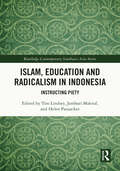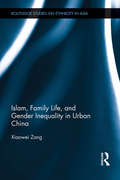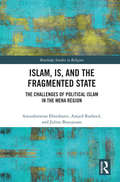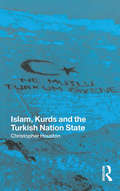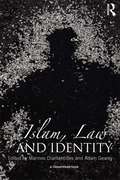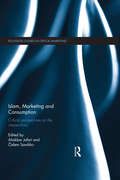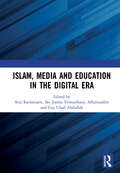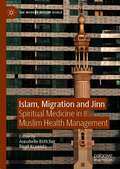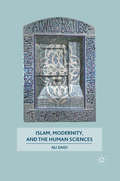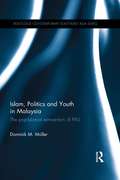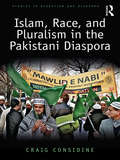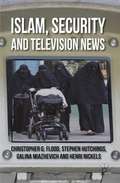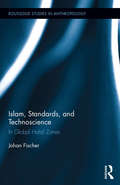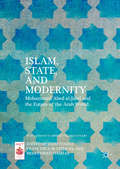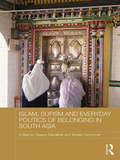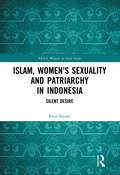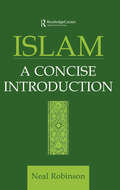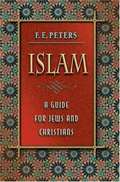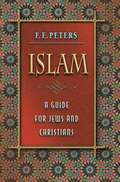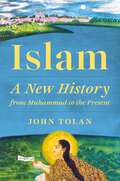- Table View
- List View
Islam, Education and Radicalism in Indonesia: Instructing Piety (Routledge Contemporary Southeast Asia Series)
by Tim Lindsey Helen Pausacker Jamhari MakrufThis book explores the connections between traditional Islamic education, rising religious intolerance, religious attitudes to gender, campaigns for curricula innovation and modernisation, and politics and society in Indonesia. Drawing on extensive original research and the deep experience of the authors, the book highlights tensions between traditional Islamic educators and modernisers, and between different understandings of Islam, emphasising the importance of these issues for the future of Indonesia.
Islam, Family Life, and Gender Inequality in Urban China (Routledge Studies on Ethnicity in Asia)
by Xiaowei ZangThis book studies the relationship between Islam, family processes, and gender inequality among Uyghur Muslims in Ürümchi, China. Empirically, it shows in quantitative terms the extent of gender inequalities among Uyghur Muslims in Ürümchi and tests whether the gender inequalities are a difference in kind or in degree. It examines five aspects of gender inequality: employment, income, household task accomplishment, home management, and spousal power. Theoretically, it investigates how Islamic affiliation and family life affect Uyghur women’s status. Zang’s research involved rare and privileged access to a setting which is difficult for foreign scholars to study due to political restrictions. The data are drawn from fieldwork in Ürümchi between 2005 and 2008, which include a survey of 577 families, field observations, and 200 in-depth interviews with local Uyghurs. The book combines qualitative and quantitative data and methods to study gendered behavior and outcomes. The author’s study reinterprets family power and offers a more nuanced analysis of gender and domestic power in China and makes a pioneering effort to study spousal power, gender inequality in labor market outcomes, and gender inequality in household chores among members of ethnic minorities in China. The book will be of interest to students and scholars of ethnic studies, Chinese studies, Asian anthropology and cultural sociology.
Islam, IS and the Fragmented State: The Challenges of Political Islam in the MENA Region (Routledge Studies in Religion)
by Juline Beaujouan Amjed Rasheed Anoush EhteshamiThis book provides a pioneering and original study of the regional effects of political Islam. It sets out the multifaceted interactions between Islam and politics in the Middle East and North Africa (MENA) region, focussing in particular on the so-called Islamic State (IS) organization in its broad discussion of political Islam. Utilizing a trans-disciplinary perspective, the book interacts with social constructivism and complex realism theories to analyse the clash between the modern notion of the state and that of identity in the region. Looking at issues such as the rise of IS and its attempts to establish a caliphate, the book offers three different, yet complementary, levels of analysis for its discussion. These being: Regional (dis)order, the erosion of state power and its boundaries, and the role of non-state actors in shaping the politics of the MENA region. Each of these levels are addressed in detail in turn in order to build a comprehensive picture of state and political Islam in the Arab core of the MENA region. What emerges is a comprehensive analysis of the interlinked relationships between political and Islamic elements of Arab polities and societies. As such, this book will be of great interest to academics and policymakers focusing on matters relating to the study of Islam, Islam and politics, study of religion more broadly, and security studies and area studies, particularly in the MENA region.
Islam, Kurds and the Turkish Nation State
by Christopher HoustonCan Islamism, as is often claimed, truly unite Muslim Turks and Kurds in a discourse that supersedes ethnicity? This is a volatile and exciting time for a country whose long history has been characterized by dramatic power play. Evolving out of two years of fieldwork in Istanbul, this book examines the fragmenting Islamist political movement in Turkey. As Turkey emerges from a repressive modernizing project, various political identities are emerging and competing for influence. The Islamist movement celebrates the failure of Western liberalism in Turkey and the return of politics based on Muslim ideals. However, this vision is threatened by Kurdish nationalism and the country's troubled past. Is Islamist multiculturalism even possible? The ethnic tensions surfacing in Turkey beg the question whether the Muslim Turks and Kurds can find common ground in religion. Houston argues that such unification depends fundamentally upon the flexibility of the rationale behind the Islamist movement's struggle.
Islam, Law and Identity
by Adam Gearey Marinos DiamantidesThe essays brought together in Islam, Law and Identity are the product of a series of interdisciplinary workshops that brought together scholars from a plethora of countries. Funded by the British Academy the workshops convened over a period of two years in London, Cairo and Izmir. The workshops and the ensuing papers focus on recent debates about the nature of sacred and secular law and most engage case studies from specific countries including Egypt, Israel, Kazakhstan, Mauritania, Pakistan and the UK. Islam, Law and Identity also addresses broader and over-arching concerns about relationships between religion, human rights, law and modernity. Drawing on a variety of theoretical and empirical approaches, the collection presents law as central to the complex ways in which different Muslim communities and institutions create and re-create their identities around inherently ambiguous symbols of faith. From their different perspectives, the essays argue that there is no essential conflict between secular law and Shari`a but various different articulations of the sacred and the secular. Islam, Law and Identity explores a more nuanced and sophisticated understanding of the tensions that animate such terms as Shari`a law, modernity and secularization
Islam, Marketing and Consumption: Critical Perspectives on the Intersections (Routledge Studies in Critical Marketing)
by Aliakbar Jafari Özlem SandikciIn recent years, a critically oriented sub-stream of research on Muslim consumers and businesses has begun to emerge. This scholarship, located both within and outside the marketing field, adopts a socio-culturally situated approach to Islam and investigates the complex and multifaceted intersections between Islam and markets. This book seeks to reflect various unheard and emerging critical voices from within the Muslim world, and provide a series of critical insights on how, if and why Islam matters to marketing theory and practice. It questions the existing assumptions and polarising discussions which underpin the portrayal of Islam as the ‘other’ of Modernity, while acknowledging that Muslims themselves are partially responsible for creating stereotyped representations of Islam and ‘the Muslim’. This wide-ranging and insightful collection will advance emerging critical perspectives, and provide new insights that will influence the generation and application of knowledge in the context of Muslim societies. It will open up fresh conversations for scholars in marketing as well as the broader humanities and social sciences.
Islam, Media and Education in the Digital Era: Proceedings of the 3rd Social and Humanities Research Symposium (SoRes 2020), 23 – 24 November 2020, Bandung, Indonesia
by Atie RachmiatieThe proceedings of the Social and Humanities Research Symposium (SoRes) shares ideas, either research results or literature review, on islam, media and education in the digital era. Some recent issues consists of innovative education in the digital era, new media and journalsm, islamic education, human wellbeing, marketing and fintech in terms of islamic perspective, economic welfare, law and ethics. It is expected that the proceedings will give new insights to the knowledge and practice of social and humanities research. Therefore, such parties involved in social and humanities research as academics, practitioners, business leaders, and others will acquire benefits from the contents of the proceedings.
Islam, Migration and Jinn: Spiritual Medicine in Muslim Health Management (The Modern Muslim World)
by Birgit Krawietz Annabelle BöttcherThis book explores the agency of Jinn, the so-called “demons of Islam”. They are regarded as mostly invisible and highly mobile creatures. In a globalized world with manifold forms of forced and voluntary migrations, Jinn are likewise on the move, interfering in the human world and affecting the mental and physical health of Muslims. This continuous challenge has so far been mainly addressed by traditional Muslim health management and by the so-called spiritual medicine or medicine of the Prophet. This book shifts perspective. Its interdisciplinary chapters deal with the transformation of manifold cultural resources by first analyzing the doctrinal and cultural history of Jinn and the treatment of Jinn affliction in Arabic texts and other sources. It then discusses case studies of Muslims and current health management approaches in the Middle East, namely in Egypt and Syria. Finally, it turns to the role of Jinn in a number of migratory settings such as Spain, Denmark, Great Britain and Guantanamo.
Islam, Modernity, and the Human Sciences
by Ali ZaidiAli Zaidi discloses a largely unnoticed dialogue between Muslim and Western social thought on the search for meaning and transcendence in the human sciences. This disclosure is accomplished by a comparative reading of Muslim debates on secular knowledge on the one hand and of Western debates on the putative death of metaphysics in the human sciences on the other hand. The analysis is grounded in dialogical hermeneutics; that is, a hermeneutic approach to texts and cultural traditions that draws upon the work of Hans-Georg Gadamer and upon the insights of inter-religious dialogue.
Islam, Nationalism and Communism in a Traditional Society: The Case of Sudan
by Gabriel WarburgFirst Published in 1978. Routledge is an imprint of Taylor & Francis, an informa company.
Islam, Politics and Youth in Malaysia: The Pop-Islamist Reinvention of PAS (Routledge Contemporary Southeast Asia Series)
by Dominik M. MuellerProviding an ethnographic account of the Islamic Party of Malaysia (PAS) and its Youth Wing (Dewan Pemuda PAS), this book analyses the genesis and role of Islamic movements in terms of their engagement in mainstream politics. It explores the party’s changing approach towards popular culture and critically investigates whether the narrative of a post-Islamist turn can be applied to the PAS Youth. The book shows that in contrast to the assumption that Islamic marketization and post-Islamism are reinforcing each other, the PAS Youth has strategically appropriated and integrated Islamic consumerism to pursue a decidedly Islamist – or ‘pop-Islamist’ – political agenda. The media-savvy PAS Youth elites, which are at the forefront of implementing new outreach strategies for the party, categorically oppose tendencies of political moderation among the senior party. Instead, they are most passionately calling for the establishment of a Syariah-based Islamic oder for state and society, although these renewed calls are increasingly expressed through modern channels such as Facebook, YouTube, rock music, celebrity advertising, branded commodities and other market-driven forms of social movement mobilization. A timely and significant contribution to the literature on Islam and politics in Malaysia and beyond, this book sheds new light on widespread assumptions or even hopes of "post-Islamism". It is of interest to students and scholars of Political Religion and Southeast Asian Politics.
Islam, Race, and Pluralism in the Pakistani Diaspora (Studies in Migration and Diaspora)
by Craig ConsidineThis book explores the Pakistani diaspora in a transatlantic context, enquiring into the ways in which young first- and second-generation Pakistani Muslim and non-Muslim men resist hegemonic identity narratives and respond to their marginalised conditions. Drawing on rich documentary, ethnographic and interview material gathered in Boston and Dublin, Islam, Race, and Pluralism in the Pakistani Diaspora introduces the term ‘Pakphobia’, a dividing line that is set up to define the places that are safe and to distinguish ‘us’ and ‘them’ in a Pakistani diasporic context. With a multiple case study design, which accounts for the heterogeneity of Pakistani populations, the author explores the language of fear and how this fear has given rise to a ‘politics of fear’ whose aim is to distract and divide communities. A rich, cross-national study of one of the largest minority groups in the US and Western Europe, this book will appeal to sociologists, anthropologists, political scientists, and geographers with interests in race and ethnicity, migration and diasporic communities.
Islam, Secularism and Nationalism in Modern Turkey: Who is a Turk? (Routledge Studies in Middle Eastern History)
by Soner CagaptayIt is commonly believed that during the interwar period, Kemalist secularism successfully eliminated religion from the public sphere in Turkey, leaving Turkish national identity devoid of religious content. However, through its examination of the impact of the Ottoman millet system on Turkish and Balkan nationalisms, this book presents a different view point. Cagaptay demonstrates that the legacy of the Ottomon millet system which divided the Ottoman population into religious compartments called millets, shaped Turkey’s understanding of nationalism in the interwar period. Providing a compelling examination of why and how religion shapes national identity in Turkey and the Balkans the book covers topics including: * Turkish nationalism* the Ottoman legacy* Kemalist citizenship policies and immigration* Kurds, Muslims and Jews and the ethno-religious limits of Turkishness. Incorporating documents from untapped Turkish archives, this book is essential reading for scholars and students with research interests in Turkey, Turkish nationalism and Middle East history.
Islam, Security and Television News
by Christopher Flood Stephen Hutchings Galina Miazhevich Henri C. NickelsFocusing on British, French and Russian television news coverage of Islam as a security threat, this book provides the first comparative account of how television broadcasting in different geo- and socio-political environments integrates discourses on Islam into nationally oriented, representational systems.
Islam, Standards, and Technoscience: In Global Halal Zones (Routledge Studies in Anthropology #28)
by Johan FischerHalal (literally, "permissible" or "lawful") production, trade, and standards have become essential to state-regulated Islam and to companies in contemporary Malaysia and Singapore, giving these two countries a special position in the rapidly expanding global market for halal products: in these nations state bodies certify halal products as well as spaces (shops, factories, and restaurants) and work processes, and so consumers can find state halal-certified products from Malaysia and Singapore in shops around the world. Building on ethnographic material from Malaysia, Singapore, and Europe, this book provides an exploration of the role of halal production, trade, and standards. Fischer explains how the global markets for halal comprise divergent zones in which Islam, markets, regulatory institutions, and technoscience interact and diverge. Focusing on the "bigger institutional picture" that frames everyday halal consumption, Fischer provides a multisited ethnography of the overlapping technologies and techniques of production, trade, and standards that together warrant a product as "halal," and thereby help to format the market. Exploring global halal in networks, training, laboratories, activism, companies, shops and restaurants, this book will be an essential resource to scholars and students of social science interested in the global interface zones between religion, standards, and technoscience.
Islam, State and Society in Indonesia: Local Politics in Madura (Routledge Contemporary Southeast Asia Series)
by Yanwar PribadiIslamic powers in secular countries have presented a challenge for states around the world, including Indonesia, home to the largest Muslim population as well as the third largest democracy in the world. This book explores the history of the relationships between Islam, state, and society in Indonesia with a focus on local politics in Madura. It identifies and explains factors that have shaped and characterized the development of contemporary Islam and politics in Madura and recognizes and elucidates forms and aspects of the relationships between Islam and politics; between state and society; between conflicts and accommodations; between piety, tradition and violence in that area, and the forms and characters of democratization and decentralization processes in local politics. This book shows how the area’s experience in dealing with Islam and politics may illuminate the socio-political trajectory of other developing Muslim countries at present living through comparable democratic transformations. Madura was chosen because it has one of the most complex relationships between Islam and politics during the last years of the New Order and the first years of the post-New Order in Indonesia, and because it is a strong Muslim area with a history of a very strong religious as well as cultural tradition than is commonly understood and is largely ignored in literature on Islam and politics. Based on extensive sets of anthropological fieldwork and historical research, this book makes an important contribution to the analysis of Islam and politics in Indonesia and future socio-political trajectory of other developing Muslim countries experiencing comparable democratic transformations. It will be of interest to academics in the field of Religion and Politics and Southeast Asian Studies, in particular Southeast Asian politics, anthropology and history.
Islam, State, and Modernity
by Zaid Eyadat Francesca M. Corrao Mohammed HashasThis book offers the first comprehensive introduction to one of the most significant Arab thinkers of the late 20th century and the early 21st century: the Moroccan philosopher and social theorist Mohammed Abed al-Jabri. With his intellectual and political engagement, al-Jabri has influenced the development of a modern reading of the Islamic tradition in the broad Arab-Islamic world and has been, in recent years, subject to an increasing interest among Muslims and non-Muslim scholars, social activists and lay men. The contributors to this volume read al-Jabri with reference to prominent past Arab-Muslim scholars, such as Ibn Rushd, al-Ghazali, al-Shatibi, and Ibn Khaldun, as well as contemporary Arab philosophers, like Hassan Hanafi, Abdellah Laroui, George Tarabishi, Taha Abderrahmane; they engage with various aspects of his intellectual project, and trace his influence in non-Arab-Islamic lands, like Indonesia, as well. His analysis of Arab thought since the 1970s as a harbinger analysis of the ongoing "Arab Spring uprising" remains relevant for today's political challenges in the region.
Islam, Sufism and Everyday Politics of Belonging in South Asia (Routledge Advances in South Asian Studies)
by Deepra Dandekar Torsten TschacherThis book looks at the study of ideas, practices and institutions in South Asian Islam, commonly identified as ‘Sufism’, and how they relate to politics in South Asia. While the importance of Sufism for the lives of South Asian Muslims has been repeatedly asserted, the specific role played by Sufism in contestations over social and political belonging in South Asia has not yet been fully analysed. Looking at examples from five countries in South Asia (India, Pakistan, Bangladesh, Sri Lanka, and Afghanistan), the book begins with a detailed introduction to political concerns over ‘belonging’ in relation to questions concerning Sufism and Islam in South Asia. This is followed with sections on Producing and Identifying Sufism; Everyday and Public Forms of Belonging; Sufi Belonging, Local and National; and Intellectual History and Narratives of Belonging. Bringing together scholars from diverse disciplines, the book explores the connection of Islam, Sufism and the Politics of Belonging in South Asia. It is an important contribution to South Asian Studies, Islamic Studies and South Asian Religion.
Islam, Women's Sexuality and Patriarchy in Indonesia: Silent Desire (ASAA Women in Asia Series)
by Irma RiyaniThis book explores the intimate marital relationships of Indonesian Muslim married women. As well as describing and analysing their sexual relationships, the book also investigates how Islam influences discourses of sexuality in Indonesia, and in particular how Islamic teachings affect Muslim married women’s perceptions and behaviour in their sexual relationships with their husbands. Based on extensive original research, the book reveals that Muslim women perceive marriage as a social, cultural, and religious obligation that they need to fulfil; that they realise that finding an ideal marriage partner is complicated, with some having the opportunity for a long courtship and others barely knowing their partner prior to marriage; and that there is a strong tendency, with some exceptions, for women to consider a sexual relationship in marriage as their duty and their husband’s right. Religious and cultural discourses justify and support this view and consider refusal a sin (dosa) or taboo (pamali). Both discourses emphasise obedience towards husbands in marriage.
Islam, Women, and Violence in Kashmir
by Nyla Ali KhanNyla Ali Khan, the granddaughter of the first Prime Minister of Jammu and Kashmir, Sheikh Mohammad Abdullah, gives an insider's analysis on the political and social turmoil that has eroded the ethos and fabric of Kasmiri culture. She monitors the effects of nationalist, militant, and religious discourses and praxes on a gender-based hierarchy.
Islam, the State, and Political Authority
by Asma AfsaruddinThe essays in this volume, written by recognized experts, deal with some of the most critically important topics concerning Islam and politics in both the pre-modern and modern periods. Each chapter provides a historically grounded and in-depth discussion of issues as diverse as the nature of government, the relationship between politics and theology, Shi'i conceptions of statecraft, notions of public duty, and the compatibility of Islam and democratic governance. Both specialists and interested readers will benefit from the volume's broad scope and thorough consideration of a variety of issues in Islamic political thought and practice.
Islam: A Concise Introduction
by Neal RobinsonThis user-friendly reference work provides an accessible introduction to Islam for the general reader and student alike. It presents a historical overview, a description of Islam as a living faith along with a discussion of the problems raised by Western perceptions of Islam. Including key dates and simple definitions, the book provides readers with explanations of technical matters such as the structure of Arabic names and the various ways of transliterating Arabic.
Islam: A Guide for Jews and Christians
by F. E. PetersThe Quran is a sacred book with profound, and familiar, Old and New Testament resonances. And the message it promulgated, Islam, came of age during an extraordinarily rich era of interaction among monotheists. Jews, Christians, and Muslims not only worshipped the same God, but shared aspirations, operated in the same social and economic environment, and sometimes lived side by side, indistinguishable by language, costume, or manners. Today, of course, little of this commonality is apparent, and Islam is poorly understood by most non-Muslims. Entering Islam through the same biblical door Muhammad did, this book introduces readers with Christian or Jewish backgrounds to one of the world's largest, most active, and--in the West--least understood religions. Frank Peters, one of the world's leading authorities on the monotheistic religions, starts with the central feature of Muslim faith and life: the Quran. Across its pages move Adam, Noah, Abraham, David, Solomon, John the Baptist, Jesus, and the Virgin Mary. The Quran contains remarkably familiar accounts of Genesis, the Flood, Exodus, the Virgin Birth, and other biblical events. But Peters also highlights Muhammad's very different use of Scripture and explains those elements of the Quran most alien to Western readers, from its didactic passages to its remarkable poetry. Peters goes on to cogently explain Islam's defining features--including the significance of Mecca, the manner of Muhammad's revelations, and the creation of the unique community of Muslims, all in relation to the Judeo-Christian tradition. He compares Jesus and Muhammad, describes Islamic commandments and rituals, details the structures of Sunni and Shi'ite communities, and lays out central Islamic beliefs on war, women, mysticism, and martyrdom. The result is a crucial and extremely accomplished book that offers Western readers a professional yet highly accessible understanding of Islam, and at a time when we need it most.
Islam: A Guide for Jews and Christians (Princeton Classic Editions Ser.)
by Francis Edward PetersThe Quran is a sacred book with profound, and familiar, Old and New Testament resonances. And the message it promulgated, Islam, came of age during an extraordinarily rich era of interaction among monotheists. Jews, Christians, and Muslims not only worshipped the same God, but shared aspirations, operated in the same social and economic environment, and sometimes lived side by side, indistinguishable by language, costume, or manners. Today, of course, little of this commonality is apparent, and Islam is poorly understood by most non-Muslims. Entering Islam through the same biblical door Muhammad did, this book introduces readers with Christian or Jewish backgrounds to one of the world's largest, most active, and--in the West--least understood religions. Frank Peters, one of the world's leading authorities on the monotheistic religions, starts with the central feature of Muslim faith and life: the Quran. Across its pages move Adam, Noah, Abraham, David, Solomon, John the Baptist, Jesus, and the Virgin Mary. The Quran contains remarkably familiar accounts of Genesis, the Flood, Exodus, the Virgin Birth, and other biblical events. But Peters also highlights Muhammad's very different use of Scripture and explains those elements of the Quran most alien to Western readers, from its didactic passages to its remarkable poetry. Peters goes on to cogently explain Islam's defining features--including the significance of Mecca, the manner of Muhammad's revelations, and the creation of the unique community of Muslims, all in relation to the Judeo-Christian tradition. He compares Jesus and Muhammad, describes Islamic commandments and rituals, details the structures of Sunni and Shi'ite communities, and lays out central Islamic beliefs on war, women, mysticism, and martyrdom. The result is a crucial and extremely accomplished book that offers Western readers a professional yet highly accessible understanding of Islam, and at a time when we need it most.
Islam: A New History from Muhammad to the Present
by John TolanA concise new narrative history of Islam that draws on the transformative insights of recent research to emphasize the diversity and dynamism of the traditionToday&’s Muslim world is in upheaval: legalists and mystics engage in intense debates, radical groups invoke Sharia, Muslim immigrants in the West face prejudice and discrimination, and Muslim feminists advocate new interpretations of the Koran. At the same time, Islam is mischaracterized as unitary and unchanging by people ranging from right-wing Western politicians claiming that Islam is incompatible with democracy to conservative Muslims dreaming of returning to the golden age of the prophet. Against this contentious backdrop, this book provides an essential and timely new history of the religion in all its astonishing richness and diversity as it has been practiced by Muslims around the world, from seventh-century Mecca to today.Most popular histories of Islam continue to repeat conventional pietistic accounts. In contrast, John Tolan draws on decades of new historical research that has transformed knowledge of the origins and development of the Muslim faith. He shows how the youngest of the three great monotheisms arose in close contact with Jewish, Christian, and other religious traditions in a mixture of cultures, including Arab, Greek, Persian, and Turkish; how Islam spread across an enormous territory encompassing hundreds of languages and cultures; how Muslims have forged widely different beliefs and practices over fourteen centuries; and how Islamic history provides crucial context for understanding contemporary debates in the Muslim world.At a time when much talk about Islam is filled with misunderstanding, stereotypes, and bias, this book provides a fresh and lucid portrait of the continuous and ongoing transformations of a religion of tremendous variety and complexity.
